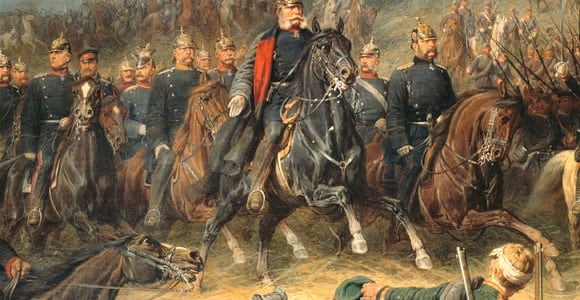U Trutnova to bylo zajímavé
23.6. 1866 Prussian army invaded Bohemia
Categories: Years of war and revolution , Calendar

Over 170,000 men died during the Prusso-Austrian War, also known as the Seven Weeks War. It also affected Bohemia, which was invaded by Prussian troops on 23 June 1866.Theconflict was only ended by an armistice signed in Mikulov.
The background to the Prusso-Austrian War was a dispute over the administration of Schleswig and Holstein. These were territories that the two rival states had conquered together as representatives of the German Commonwealth in the war against Denmark in 1864. Austria wanted independence for Holstein, but this was refused by Prussian Chancellor Otto von Bismarck.
Austria prepared 261,688 soldiers for battle, with 283,000 men in reserve. Prussia 254,000 soldiers, with 291,738 men in reserve. The Prussian generals took advantage of the joint military operations in 1864 to obtain thorough information about the enemy army. The core of the Prussian army, the first in Europe to be replenished by universal conscription and armed with rifles, was ordered to advance into Bohemia on 22 June 1866.
"The day before, all three Prussian armies had been on the march towards the Bohemian frontier with the aim of invading Bohemia from three sides: From Dresden (Elbe Army), from Upper Lusatia (First Army) and from Kladsko (Second Army). Each of these armies had its own task. The Elbe Army of 46,000 men was assigned to fight in Saxony in western Bohemia, the First ArmyArmy of 93 thousand men was to cross and secure the Czech border in the Lusatian and Jizera Mountains, and finally the strongestThe strongest Second Army of 150 thousand men was assigned to cross the Czech border in the Kladsko and Krkonoše Mountains," says Vojtěch Szajkó in his book Railways, Post and Telegraph of the Austrian Army in 1848-1914.
In addition, the 1st Reserve Corps of 24,000 men was still in Berlin, part of which, with 11,000 men commanded by Counts Knobelsdorff and Stolberg, later invaded Austrian Silesia. Meanwhile, the Prussian auxiliary forces smoothly neutralized those German states that sided with Austria. Thus, for example, Saxony was already occupied on 16 June.
"The Prussian soldiers only needed a regular express train on the Berlin-Dresden line to cross the border. The Saxon royal court including the army corps fled to Prague and the Saxon army then fought on the side of the Austrian army. At the same time, 200,000 Italian soldiers attacked Austria," Szajkó adds.
The armistice was not signed until 26. A month later, on 23 August, the representatives of the two opposing sides signed a peace treaty in Prussian-occupied Prague. This ended the so-called Seven Weeks' War. Austria lost Holstein, Lombardy and Venice. The German Commonwealth was in ruins.
Sources:
www.1866.com
Vojtěch Szajkó, Railways, Post and Telegraph of the Austrian Army 1848-1914
Luboš Taraba, Sold Victory: The Last War for the Liberation of Italy 1866
https://article1000.com/
The article is included in categories:



